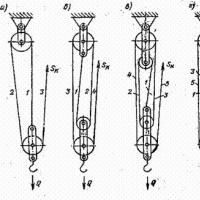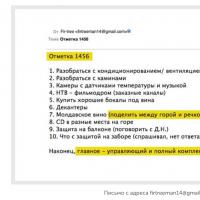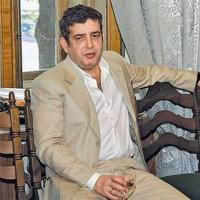Rabinovich mikhail daniilovich. "Sticky" Russian Railways? Seagull and others
The change of the head of Russian Railways from Vladimir Yakunin to Oleg Belozerov did not affect the work of the state company. Thus, the company still prefers to conclude contracts for government orders from the same suppliers, which are related to each other.
KPMG analyzed the activities of the Federal Passenger Company (a subsidiary of Russian Railways) and came to the conclusion that about 80% of contracts for the maintenance of carriages were concluded by FPK with a single supplier. In some contracts, the auditors found signs of fictitiousness.
For example, the contract between FPC and Transremkom dated April 30, 2014 did not indicate the place of work, the specification of electrical systems and devices that should be equipped with cars.
According to auditors, in the period from 2013 to 2015, groups of related companies controlled 70% of the material costs of FPK.
The contractors FPC "Vagon-service" and "Vagonremmash" are interconnected. Through a chain of persons, these firms are associated with Andrey and Oksana Severilov, who are associated with Mikhail Rabinovich, a member of the board of directors of FPK subsidiaries - Russian Railways Tour and Travel Tour, as well as with Konstantin Filatov, a member of the board of directors of RTK, another FPK “daughters”, Vedomosti reports.
Mikhail Rabinovich, in turn, is associated with the ex-head of Russian Railways Vladimir Yakunin. In 2006, Mr. Rabinovich was the general director of the Sectoral Center for the Implementation of New Equipment and Technologies (OCV), which is 43.43% owned by Russian Railways.
In 2015 alone, OCV received more than 8 billion from the railway monopoly under government contracts. In 2016–2017, the company received contracts for 1.9 billion rubles.
According to the auditors, the OCV contracted to service and maintain innovative products and systems used by Russian Railways.
The general director of Infoline-Analytics, Mikhail Burmistrov, noted that the government contracts were transferred on an uncontested basis to the OCV, and not to the organizations that were directly involved in the development, production and installation.
Another recipient of contracts for Russian Railways, Vagon-Service, through ZhSA, owns 75% of Vagonremmash. Wagon-Service itself is 44% owned by the Cypriot Midlake Holdings, which is 99% owned by the VGS Group management company. Until 2011, the VGS Group was wholly owned by Oksana Severilova, who until September 2012 owned the Davinchi holding company, which is now 80% owned by Mikhail Rabinovich and 20% by Andrey Severilov.
According to KPMG, he believes that in 2013–2015, companies associated with Rabinovich received contracts for 37 billion rubles from FPK. In addition, many contracts provide for the indexation of the cost of the contractor's work, which led to a rise in the cost of work by 10%.
The FPK and Russian Railways do not comment on information on purchases under government contracts from the same suppliers.
The problem of processing and disposal of solid household waste (MSW) in megalopolises, and especially within the Moscow agglomeration, has turned into a source of social tension, as well as headaches (and, at the same time, shadow income) for officials of different levels. According to Ministry of Ecology of the Moscow Region, out of 55-60 million tons of all solid waste generated annually in Of Russia, a fifth (11.7 million tons) falls on the capital region (3.8 million tons - Moscow region, 7.9 million tons - Moscow). At the same time, 6.6 million tons of household waste is removed from the city outside the Moscow Ring Road. Thus, more than 10 million tons of garbage are deposited in the region. Now 85% of Moscow waste is taken to landfills, 14.5% is sent to two incinerators, the remaining 0.5% is separated during sorting and recycled as secondary raw materials.
Protests against rubbish facilities occur regularly and Moscow suburbs, and in neighboring areas, the residents of which are afraid of the appearance of huge dumps or hazardous enterprises for solid waste from the capital. So, in Vladimir region residents protest against the construction of a waste processing facility on the border with the Moscow region. V Kaluga region sound the alarm about the plans of the regional governor Anatoly Artamonov to launch a landfill in the Iznoskovsky district.
Having lost the opportunity to use the services of landfills, garbage trucks began to dump waste into ditches and forests or stopped taking garbage out of settlements.
The authorities seem to be reacting. Since 2013, 24 out of 39 landfills have been closed in the metropolitan area, including four in 2017 following a complaint from residents Balashikha to the president Vladimir Putin during a straight line in June 2017. In 2018, four more landfills are to be closed in the Moscow region. But this decision gave rise to new problems. Having lost the opportunity to use the services of landfills, garbage trucks began to dump waste into ditches and forests or stopped taking garbage out of settlements.

Andrey Vorobyov, photo by RIA Novosti, Vladimir Song
The situation worsened after the release of garbage gas at the landfill Soundly near Volokolamsk and the poisoning of schoolchildren, which no longer gave rise to a protest, but a real social explosion, which dismissed the head of the district Evgenia Gavrilova and shook the position of the Moscow region governor Andrey Vorobyov.
Friendly family
At the same time, it seems that there are no special complaints about the entrepreneurs who operate the landfill. The landfill near Volokolamsk belongs to OOO Yadrovo. 75% of the enterprise belongs to the company CMPT, which has four co-owners, each of which owns 25%. One of them - Alexey Voloshin, according to RBC, entered the garbage business at least 15 years ago. Another co-owner - Victor Koshkin, manages LLC Amalgam Rail Management», Controlled by the Cyprus Amalgam Rail Investments. Last spring, the offshore company bought out freight car leasing operator Brunswick Rail. Koshkin confirmed to RBC that he is one of the founders of the CMPT, but "is not involved in operational management."
At the same time, he is clearly “involved in the operational management” of the subsidiary company CMPT LLC “ Istra-Resource», Of which he is the general director. "Istra-Resource" has received government contracts for the collection and disposal of waste from the municipal enterprise " Istra landfill for solid waste", Which at one time was led by ... Alexey Voloshin.
There is no doubt that the co-owners of the CMPT live amicably. But how does the beneficiary of Brunswick Rail react to the out-of-pocket fishing of its CEO? Vladimir Lelekov? It seems that Koshkin is subordinate to a fair amount of economy, which requires full dedication from the top manager. Brunswick rail is considered one of the largest players in the railcar operating leasing market in Russia. According to INF Oline Rail Russia Top, at the end of 2016, the company ranked second in this market with a fleet of 25.7 thousand cars. Net profit for 2016 amounted to $ 124.3 million, but the total debt has accumulated quite decent - $ 638 million.

Vladimir Lelekov
Most likely, Vladimir Lelekov treats the CEO's garbage hobby with at least understanding. According to the corporate website of Brunswick Rail, “in 2014 Lelekov acquired a stake in OOO“ League-Trans"(Ranks among the largest companies in the collection and sustainable waste management sector) and became chairman of the board of directors of the company."
According to the database Rusprofile“Liga-Trans” has only one state contract with the small enterprise “DEZ ZhKU” for “miserable” 389 million rubles. But the subsidiary company “ Ecoline"299 contracts for 25.98 billion with the municipal enterprise" Mosekoprom "and several structures of the State Budgetary Institution" Dweller"From the Central District of Moscow! Another "daughter" deals with solid waste in Dolgoprudny, "Ecoline-MO" is working on the creation of a landfill in Alexandrov(Vladimir region). For comparison: the companies controlled by Amalgam Rail Management, Profexpotrans and Profftrans, have one contract with RZD-Logistics"By 5 million and 30 million rubles, respectively. It can be seen that Mr. Lelekov's "garbage" assets bring in more railroad assets.
Seagull and others
In addition to Ecoline, at the top of the capital's garbage pyramid, there were several structures, the owners of which are also directly related to rail transport. In 2012-2015, the mayor's office Moscow held nine tenders. For some reason, none of the previous players took part in them, but debutants appeared, who eventually divided the Moscow garbage market.
The two largest lots in terms of the amount of 42.6 billion rubles were won by the company " The charter". Officially, the director of the Charter was considered Alexander Tsurkan, unofficially controlled the company Igor Chaika... The son of the Prosecutor General of Russia is the main supplier of crushed stone and reinforced concrete sleepers for the needs of Russian Railways through the First Non-Metallic Company and the BetElTrans enterprise. In addition, now Igor Chaika has direct contact with the carrier " UVZ-Logistic».

Igor Chaika, photo by RIA Novosti, Maxim Blinov
Chaika formalized his legal relationship with Charter only at the end of 2017, having closed the deal to buy 60% of the company's shares. The company plans to take over the management of the Moscow-owned waste incineration plant No. 4 (MSZ-4). It is located in the industrial zone " Rudnevo”And is the largest incineration plant in the capital region, recycling about 275 thousand tons of waste per year. MSZ-4 generates up to 60 million kWh. electricity, part of which it transfers to the Moscow power grid, and also fully provides itself with thermal energy. The media assure that Igor Chaika plans to crush the recycling business in Tula, Vladimir and Yaroslavl regions, so that, walking along the "Golden Ring" of Russia, and later delve into the regions. The businessman himself in a conversation with RBK noted that the company is considering the possibility of entering the MSW market in the Moscow region.
Contract for 40 billion rubles. for the removal and disposal of garbage was received by the company "MKM-Logistics". The capital of the company was divided between three offshore companies: two Cypriot and one from the British Virgin Islands. The beneficiary of one of the Cyprus offshore companies is Roman Abramovich... Market participants told Forbes that the success story of MKM-Logistics began in the summer of 2011, when the mayor of Moscow Sergei Sobyanin Roman Abramovich came with a presentation of a new waste sorting complex.
At the end of last year, the structure of LLC " Enisey Capital"At NPF" Welfare"24.5% of shares" Transcontainer". At the meeting of the operator's board of directors held in February, representatives of the new owners received two seats in the governing body of PJSC TransContainer. According to TASS, Enisey Capital also nominated the CEO of MKM-Logistics Andrey Komarov, but the manager of the garbage giant was not included in the updated composition of the board of directors of TransContainer.
Another 12.4 billion rubles from the capital's waste is owned by the company Spetstrans", Which is part of the corporation" Rostec", Which is currently subject to" Uralvagonzavod". So far, Rostec has the smallest share in the Moscow MSW market, but Sergey Chemezov large-scale, and most importantly, real plans for expansion in this area. RT-Invest, owned by Rostec, won tenders for the construction of waste incineration thermal power plants (MTES) in the Moscow region and Kazan where she is also the owner of the largest waste collection operator.
It is expected that the four factories in the Moscow region will dispose of 2.8 million tons of waste in total, while generating 280 MW of electricity, which, by the way, will turn out to be very expensive. This volume of processing will allow to reduce the level of waste disposal at landfills in the region by 30% by 2023.
Will Russian Railways take out?
OJSC Russian Railways could not ignore such a rapidly growing industry. The state corporation offered their services, assessing that the railway workers are able to remove up to 3 million tons of garbage from Moscow and up to 2 million tons from St. Petersburg... Russian Railways presented their initiative at a meeting with Moscow waste collection operators. As we have already, at the presentation of the project, representatives of the monopoly tried to substantiate the advantages of transporting solid waste by rail compared to road transport: large volumes, accurate schedule, environmental friendliness, comparable costs.
According to the plan of Russian Railways, the operators should build all the infrastructure at these sites at their own expense.
And here's a riddle for you: what kind of audience reception did the propagandists of the project expect, which destroys the schemes debugged by the operators? In addition, the monopoly assumes that waste sorting complexes will be located at the junction cargo stations, where waste will be transported from different districts of the city, pressed and transported in wagons to other regions. Moreover, according to the plan of Russian Railways, the entire infrastructure at these sites should be build at your own expense.
The operator of the garbage collection project was chosen by the subsidiary company of Russian Railways "Industry Center for the Implementation of New Equipment and Technologies" ( OCV). According to the monopoly itself, the center belongs to it only 43.43%, and 49.9% belongs to the company " Zheldorkconsulting", Which through a series of" pads "is connected with the entrepreneur Mikhail Rabinovich.
The Rusprofile portal counted 444 contracts with Russian Railways for the amount of almost 10 billion rubles. As the CEO noted, “ Infoline analysts» Mikhail Burmistrov, OCV has closed on itself the service and maintenance of innovative products and systems used by Russian Railways: fire automatics, telemechanics, video surveillance and remote control, while the contracts were transferred to the contractor on a non-alternative basis, although warranty repairs would be cheaper.
Previously, Mikhail Rabinovich officially headed the OCV, and now he is associated with the companies " Car service" and" " Vagonremmash", Which are engaged in repairs for the Federal Passenger Company ( FPK). Analysts KPMG considered that in 2013–2015. structures associated with Rabinovich received contracts for 37 billion rubles from the subsidiary of the state corporation. So maybe it was not Russian Railways who chose the "Industry Center for the Introduction of New Equipment and Technologies," but Rabinovich chose Russian Railways to penetrate a promising market under his cover? In the end, why is Rabinovich worse than Abramovich ...
Moscow region introduces cremation
General Director of OCV Yuri Tyrtyshov confident in the profitability of the project. According to him, the Moscow authorities expressed preliminary interest, preliminary consent for funding was obtained from VEB... Also, according to the head of the OCV, the state could provide subsidies for this service, given that the transportation of waste by rail is more environmentally friendly, and restrictions can be imposed on transportation by road over long distances.
The same simple-heartedness is distinguished by the OCV's ideas about where to take out the capital's rubbish. It is believed here that abandoned objects can become landfills. Ministry of Defense and landfills where chemical weapons were previously destroyed. There are seven of them in Russia. True, it would be worth considering that, first, there you need to process the harmful substances left over after the destruction process.
The head of the monopoly, Oleg Belozerov, admits that "while there are negative elements in terms of economic calculations."
Assesses the prospects of the garbage project quite soberly Russian Railways CEO of monopoly Oleg Belozerov... Speaking at the Russian Investment Forum in February, he confirmed the readiness of the state corporation to provide environmentally friendly transportation of waste waste, but at the same time he actually admitted that the implementation of the project is a matter of an uncertain future. Belozerov stressed that Russian Railways are ready to carry out such transportation if a special tariff is set. "Such a well-oiled mechanism will be worked out in the future." At the same time, the head of the monopoly admits that "while there are negative elements in terms of economic calculations."
Meanwhile, Russian Railways and Rostec are already trying to compete in the garbage market in southern Russia. According to the general director of the OCV Yuri Tyrtyshov, the management Krasnodar Territory gave instructions to the heads of cities Black Sea coast select sites where it would be possible to organize the primary acceptance, sorting and processing of waste with subsequent removal by rail. Three clusters in the south of Russia are going to be created by "Rostec". The first of them, MTES in Sochi, will be able to process 0.55 million tons of waste annually. So the authorities Sochi there is a choice: burn or export.
As for the Rostec project near Moscow, it has already entered a decisive stage. At the end of 2017, Governor Andrei Vorobyov announced that the region could double (from four to eight) the plan for the construction of incinerators. It is now clear that the factories will be built even ahead of schedule. This is due to the lack of landfill sites due to the closure of most landfills and the conservation of the landfill. " Raspberries" v New Moscow... The conflict in Volokolamsk gave the process additional acceleration. Just the other day it became known that construction will begin this year, for which Rostec ordered equipment for 20 billion rubles.
Mikhail Zadorozhny
Photo by RIA Novosti, Maxim Blinov
A group of top managers of Russian Railways JSC, employees of industrial universities and the Industry Center for Implementation CJSC was awarded for the development of new technologies for driving passenger and freight trains based on intelligent systems for driving and traffic safety management.
1. GAPANOVICH Valentin Alexandrovich, Vice President of JSC Russian Railways, head of work;
2. BARANOV Leonid Avramovich, Moscow State Transport University, Head of the Department of Management and Informatics in Technical Systems, Doctor of Technical Sciences, Professor;
3. BUSHNENKO Yuri Viktorovich, Ph.D., Leading Researcher, All-Russian Scientific Research Institute of Railway Transport;
4. DONSKOY Alexander Lvovich, Deputy General Director of CJSC "Industry Center for the Implementation of New Equipment and Technologies";
5. EMELYANENKOVA Elena Lvovna, Ph.D., Deputy General Director of OTSV CJSC;
6. KOBZEV Sergey Alekseevich, Head of the Locomotive Economy Department, Russian Railways;
7. Muginstein Lev Alexandrovich, Doctor of Technical Sciences, Head of the "Comprehensive Department of Train Traction and Economy of Fuel and Energy Resources" of VNIIZhT;
8. NIKIFOROVA Nina Borisovna, Ph.D., head of the laboratory "Microprocessor control systems for electric rolling stock" VNIIZhT;
9. RABINOVICH Mikhail Danilovich, General Director of OTSV CJSC;
10. STAROSTENKO Vladimir Ivanovich, Head of the Moscow Railway - a branch of Russian Railways.
Valentin Gapanovich:
- - The strategy of innovative development of the company includes the development and implementation of science-intensive technologies, among which the automotive science takes one of the first places. Now, locomotive and car builders are creating a new range of equipment that will make it possible to more efficiently solve transportation problems, provide more opportunities to use the advantages of automated train driving. That is, there is a positive feedback - the means determine the technique and vice versa. The new technology, thanks to the use of automatic driving, provides the effect of reducing the consumption of electricity for traction of trains and, in addition, helps to streamline the relevant regulatory framework.

- - Traffic intensity in a number of directions has reached the highest values, and in these conditions, the accuracy, reliability and safety of the schedule becomes of paramount importance. It is this most important property that the driving science has. It is able to automatically ensure the execution of the schedule with an accuracy of 30 seconds. It is also important that in case of possible deviations from the schedule, auto-guidance automatically compensates for them with unconditional compliance with the requirements of traffic safety, preventing overloading of traction equipment, longitudinal dynamic forces in the train, passenger comfort, etc. In conditions of high-intensity traffic, the work of the driver is extremely intense. The developed new locomotive automation, unloading the driver, reduces his fatigue by at least one third and increases the reliability of his control activities by an order of magnitude, thereby realizing the positive aspects of the human factor.

- - The work performed is largely distinguished by novelty and originality. Its successful completion was the basis for the development of automation of other locomotive equipment - traction, braking, the basis for the creation of an automatic diagnostic system, etc. However, we cannot stop there. Based on the experience gained in managing complex projects, the development of the Industry Implementation Center will be required to solve new problems.

- - In the work performed, the equipment and technologies of tomorrow, which seemed unattainable, were successfully used for the needs of today. The results obtained correspond to this. A motorist has been created whose artificial intelligence is almost as good as that of a present driver, and in some cases even surpasses it. Having received the assignment for the trip, the motorist knows exactly how to drive the train exactly on schedule, with minimal power consumption for traction while ensuring a safe level of longitudinal-dynamic forces in the train. If, for any reason, the initial task is changed, the motorist takes it into account in real time and performs it accurately. I would like to emphasize that behind the seeming simplicity of the system's operations there are very deep, world-renowned scientific results.
ZAO "OCV" together with the administration of Krasnodar will be engaged in the construction of a residential complex. Has nothing changed after Vladimir Yakunin's departure?
An agreement was signed between the administration of Krasnodar and ZAO "Industry Center for Implementation" (OTsV) on the removal of railway tracks from the city. It is planned to build a light rail line, roads and housing on this site. This was reported by the correspondent of The Moscow Post.
The implementation of the project will help unload Krasnodar, which is constantly stuck in traffic jams because of this section of the railway line. But it's not just good intentions. The project will require tens of billions of rubles, which will go from the budgets of all levels: federal, regional and city. And it will be possible to "cut" this money to its fullest.
And if you attract investors and the right contractors, then the project will become a "gold mine" for several years, both for regional and city officials, and for the head of Russian Railways Oleg Belozerov, whose department owns 43.4% of OCV shares. 70 hectares of Krasnodar land is a very tasty piece.
OCV was founded back in 1999 and there is no doubt that it participated in the schemes of the ex-head of Russian Railways Vladimir Yakunin, who headed the department for 15 years. Another founder of the OCV is the Zheldorkconsulting company, but its beneficiaries are Cypriot firms. Isn't Vladimir Yakunin behind them?

The main contractor for the OCV is Russian Railways and its structures.

It is not the first time that OCV has been acting as a builder. Back in 2007, the company became the developer of 6 plots with a total area of 46 hectares in the center of Moscow, where it was planned to build 1.4 million square meters. In total, Russian Railways and the Moscow authorities were developing a concept for the development of 17 sections adjacent to the railway tracks.
So, the Russian Railways have worked out the scheme of work with OCV for a long time. And this is evidenced by both the number and the amount of contracts. They worked under Yakunin, they also work under Belozerov. And why change something if everything suits everyone?
Is Rabinovich Yakunin's man?
In 2006, the OCV was headed by Mikhail Rabinovich, and now he is associated with the companies Vagon-Service and Vagonremmash, which are engaged in repairs for the Federal Passenger Company (FPK), a subsidiary of Russian Railways. Very comfortably. For example, repairing one car at Rabinovich's factories can cost 2.1 million rubles. , in its own depot FPK -1.4 million rubles., in the company OVRK -1.04 million rubles. Why repair yourself when you can get a "rollback"?
According to the plan in 2016 - 2019. it was planned to repair 1.3 thousand cars, which would cost 2.8 billion rubles. Repairing them in our own depot would cost 1.6 billion rubles. Are the benefits for Rabinovich and Belozerov obvious?
Companies associated with Rabinovich in 2013-2015 received from the FPK contracts for 37 billion rubles. Was there something to share? Probably yes, because Vladimir Yakunin now lives in Europe. And Mikhail Rabinovich, apparently continues to earn money for himself and Oleg Belozerov. And it is possible that some of them fall to Yakunin.
The communication scheme of Rabinovich's enterprises is very confusing. Vagon-Service, through ZhSA, owns 75% of Vagonremmash. And Wagon-Service itself is 44% owned by the Cypriot Midlake Holdings. It is clear from its statements that for Wagon-Service, Transremkom and Lokomotiv Transservice they act as related parties and guarantors of the VTB loan, which was received by ZhSA.
Midlake Holdings owns 99% of the VGS Group management company. Until 2011, it was owned by Oksana Severilova, and then - the Cypriot "Antell Investment". Severilova until September 2012 owned the Davinchi holding company. Now it is 80% owned by Mikhail Rabinovich, 20% - by Andrey Severilov. They, apparently, are the main partners of Belozerov.
Old saws?
Having headed Russian Railways, Oleg Belozerov not only kept the old Yakunin schemes, but also continued to work with the partners of the ex-head of Russian Railways. One of these is the firm "Transmashholding" by Iskander Makhmudov.
In January, Russian Railways sold its stake in the Central Suburban Company (TsPPK) to an unknown firm "Route Systems" with an authorized capital of 10 thousand rubles. 50% of the shares of TsPPK belonged to the Moscow-Tverskaya Suburban Passenger Company (MT PPK), which is directly related to both Russian Railways and Transmashholding.
Back in 2012, Russian Railways sold 75% of Zheldorremmash shares to Makhmudov's TMH-service company, and then provided him with an order for 50 billion rubles. This, apparently, was one of the schemes of Vladimir Yakunin's work.
Oleg Belozerov follows the same path, sold his stake in the company, and now, apparently, will provide MT PPK with orders. It has already completed them for 9 billion rubles. , will continue to perform. The circuits are old, but they work!
Oleg Belozerov has not changed anything at Russian Railways. Yes, he, apparently, does not need it. The "corruption trailer" is rolling by itself with Vladimir Yakunin's partners adhered to it. But is such a "sticking head" necessary for Russian Railways itself?
Passenger transportation by rail is a loss-making business, Russian Railways has repeatedly warned about this. Nevertheless, after the start of the reform of the natural monopoly, private companies began to enter the elite segment of this market.
Around midnight, a respectable audience appears at the Leningradsky railway station. Men in expensive coats and ladies in furs intend to follow the Moscow - St. Petersburg route by the "Grand Express" train. The train is rather short in comparison with those on the neighboring platforms, only 14 cars. Outside, the cars are standard, no different from others. But inside there is luxury. The owner of the train, the "Grand Service Express" company, calls his brainchild in advertising brochures nothing more than a "hotel on wheels". Indeed, it seems. The compartments are twice the size of the standard ones; they can be opened and closed with individual key cards; inside there are soft carpets and mahogany wood. Shower rooms, terry dressing gowns. Instead of ordinary shelves, there are sofas that can be laid out almost one and a half meters. TVs, DVD, Wi-Fi. Prices are appropriate. The cheapest ticket - a first-class carriage - costs 3.4 thousand rubles on a typical day. The most expensive one is in the "Grand de Luxe" compartment (ten meters tall, with a heated floor and a hairdryer in the shower room) - 16 thousand rubles. On New Year's Eve, it will be possible to leave for St. Petersburg on the Grand Express for at least 4,900 rubles, in the Grand de Luxe - for 21,500 rubles. we do not have economy class cars at all, but they are in Krasnaya Arrow, "says Oleg Kaverin, General Director of Grand Service Express.
The Grand Express was launched in May 2005, at that time it was the only private train on the Russian market. The company does not disclose the composition of shareholders, but market participants claim that the main shareholder of the company is the owner of the carriage building plant "Zircon-Service" Mikhail Rabinovich. Starting the train, the head of the Ministry of Transport Igor Levitin handed the driver a symbolic key and cut the ribbon, sort of welcoming the pioneers of the market in the face of the Grand Express. The public is attuned to the rapid development of the private passenger transport sector. However, to date, there are only two private trains in Russia. The second - from the Tverskoy Express company - appeared in October this year, also on the Moscow - St. Petersburg branch, but occupied a different sector - tickets for it cost from 1,500 to 3,000 rubles. The shareholders of Tverskoy Express are also quite close to the structures of Russian Railways - they are the main suppliers of rolling stock and locomotives to Russian Railways, Tverskoy Carriage Works and Transmashholding. In addition to two trains, there are three more private trains. Two of them go along the same route Moscow - St. Petersburg (from the Passenger Transportation company, owned by Severstaltrans and from the refrigeration company Paritet), the third one - along the Moscow - Kaluga route, acquired and launched by a forwarding company "Transgroup AS". Meanwhile, another three dozen private companies have received licenses for passenger transportation, although they have not yet succeeded in launching their projects.
The torment of the reformers

"Grand Express" is designed for passengers with great appetites
Problems with entering the passenger transportation market are due to the fact that this process has not yet been fully formalized in legislation. And this is not least due to the fact that Russian Railways itself does not yet have a clear vision of how this segment should develop.
"Any company can enter the passenger transportation market, since the reform of Russian Railways presupposes equal accessibility of the railway infrastructure," says Igor Plotnikov, deputy head of the public relations department of Russian Railways. According to the official version, the main condition for becoming an operator of this market is the presence of its own rolling stock - the lease of Russian Railways cars is not encouraged, since Russian Railways itself does not have enough of them. The scheme of interaction is as follows: a merchant comes to Russian Railways, declares his intentions, in case of a positive decision, he is allocated a schedule thread. After that, four contracts are concluded with him: for dispatching support, for locomotive traction (locomotives cannot be privately owned yet), for the provision of utilities in home parks and for a ticket sales system - this system has not yet been demonopolized.
In reality, of course, everything is much more complicated. “Why should Russian Railways allow private business to enter the most profitable sectors of passenger transportation?” Asks Leonid Komarov, Deputy Marketing Director of the Federal Passenger Inspection (FPI is the body responsible for passenger transportation in the new structure of Russian Railways). in the amount of 27 billion. The only profitable sectors of this market are the "golden lines" (among them Moscow - St. Petersburg), the deregulated sector (compartment and SV), tourism (saloon cars, tourist trains). By giving these areas to business, we thereby we increase the losses of the state. " Unlike freight traffic, where private business has already overtaken Russian Railways in terms of volume, the passenger traffic direction can boast of only four projects so far. For each of them, the management of Russian Railways made individual decisions, but there is no single package of regulatory documents on the admission of private passenger transport to the railway.
“Regarding private carriers, Russian Railways and the state have not decided yet,” says Gennady Venediktov, general director of Okdail. , making strategic plans is pointless. " Oakdyle, however, is making such plans. Two years ago, the company announced its intention to launch the Baltic Express train and even decided to finance the purchase of wagons.

The Eurosib company planned to create the First Passenger Company - in the summer of 2006 it was supposed to launch a high-speed double-deck electric train on the same (Moscow - St. Petersburg) route. Here the difficulties arose even more: in addition to the usual approvals, certification of the imported wagon train was required. The project is currently frozen.
“It is quite possible that Russian Railways is creating administrative barriers for independent carriers to enter the market,” says Oleg Kaverin from Grand Service Express. as well as a fundamentally new type of service and a perfect service offered to the passenger, played a decisive role in the launch of the joint project "Grand Express" ".
Transportation is not so scary
The indicators of annual losses of Russian Railways (27 billion rubles) on passenger traffic could scare away private traders, but there are no inexperienced neophytes in this market. “Before launching our own train, we worked as outsourcing for Russian Railways for three years - we were engaged in charter transportation, since 2003 we served luxury cars in two branded trains, - says Oleg Kaverin. traditional service in order to improve the quality of our services. After all, we cannot take by the volume of traffic - there are no such financial possibilities. But we can take quality. " Now the company is thinking about how to improve the service, serving the client "from door to door": along with the order of the ticket, the company is ready to provide a taxi in Moscow and St. Petersburg, any special meals on board the train, hotel booking, additional service.
The project, according to its managers, is profitable: its cost, taking into account lease payments and interest payments on loans, will amount to 1.2 billion rubles, the planned payback period is six years.
“Our calculations show that the traditional approach to the formation of trains can lead to a loss of 15 to 40% of income,” says Gennady Venediktov from Okdale. according to the optimal scheme, but in principle, passenger transportation can bring very good results. "
Even in such a traditionally unprofitable direction as commuter trains, the profitability of passenger traffic can be tens of percent. This became obvious after Russian Railways started creating suburban passenger companies jointly with regional administrations. In those regions where the administrations treated business like a business, the companies literally the next year after their creation began to make a profit - for example, the companies "Omsk-Prigorod", "Novosibirsk-Suburb" and some others. To do this, it was only necessary to install turnstile lines to combat free-riders and introduce a more flexible approach to the schedule and composition of trains. The Transgroup AS company, which was created by the then Minister of Railways Nikolai Aksenenko, was also convinced that electric trains can be profitable. Now, in addition to its Moscow-Kaluga train, within two years, the company wants to launch branded trains Moscow - St. Petersburg, Moscow - Tver, Moscow - Kryukovo (Zelenograd), as well as participate in the formation of suburban passenger companies in the regions and in intermodal transportation Moscow - Sheremetyevo airport (as in the direction Paveletsky railway station - Domodedovo).
The Passenger Transportation company, which is part of Severstaltrans, is not making big plans yet, it wants to wait for a new price list for passenger transportation.
The executive director of the Tverskoy Express company, Alexander Chubarev, claims that the operating profit from the operation of the Megapolis train is 80%, but the payback period of its project is significantly longer than that of the Grand Express - until 2014. “We are very pleased with our performance,” he says. “The train runs for only a month and a half, and immediately reached 74% of the load. Even though for two days out of the first month our platform at the Leningradsky railway station was repaired and we were sent from Kievsky.” As early as December 6, the company plans to launch a second train so that Megapolis leaves not every other day, but every day. And next year Tverskoy Express will add another train in this direction, as well as launch the Moscow - Samara, Moscow - Kazan and Moscow - Helsinki routes. “Of course, we are able to provide the quality of service higher than on Russian Railways trains,” says Alexander Chubarev. , we are very responsive to the wishes of our clients. Our carriages also have showers, there are opportunities for the movement of disabled people, there are sockets for connecting laptops. The reviews for the first month were very warm. "
“If we had such shareholders, we would run ten trains a year,” Oleg Kaverin envies. However, without changing shareholders, "Grand Express" still expects to launch another train from Moscow in a year (in 2008), but it has not yet been decided which of the million-plus cities it will go to.
Nobody wanted to give

Meanwhile, Russian Railways is also increasing its presence in the lucrative segment of passenger transportation. This applies to both the branded train segment and the tourist destination. To work with tourists, Russian Railways has created a special subdivision "Russian Railways Tour". This company intends to provide services for the organization of individual and collective trips on the railways of Russia and beyond. At the disposal of "RZD-Tour" there are 15 branded Russian Railways trains, saloon cars (in addition, this year Russian Railways purchased 15 such cars), conference cars, a bar car and restaurant cars, even a church car, recently built at Moscow Factory named after Voytovich. In addition, the company plans to build new tourist trains. RZD-Tour's ambitions are great: the company has already signed an exclusive agreement with the international operator Orient Express on the sale of 19 railway tours of this operator in Russia, and is preparing similar agreements with other foreign companies. "We assume that already in 2007 we will be able to make the first project based on the rolling stock of Russian Railways to serve VIP clients along jointly developed routes. At the same time, we will need to work out such tourism directions that are completely new on the market, which no one else offers. ", - said the director of development of the company Valery Gendelev.
However, Russian Railways is still not able to provide quality services to the entire growing elite segment on its own, so the number of private companies outsourcing to Russian Railways in these areas is increasing from year to year. It is felt best of all by factories specializing in the production of elite cars and special purpose cars: "Zircon-Service", the Voitovich Plant, this segment has grown at the Tverskoy Carriage Building. At these enterprises, we were informed that these cars are bought not only by Russian Railways, but also by private structures. “We feel that the demand for luxury and tourist transportation by rail is growing. Now it is almost close to the level of the early 1990s,” says Gennady Venediktov. This creates the basis for cooperation with Russian Railways in servicing their charters and encourages private companies to acquire their own wagons for transporting tourists.
So far, Okdyle provides services to passengers of four trains - Nikolaevsky Express, ER-200, Aurora, and Nevsky Express. In addition, Oakdyle owns several luxury carriages, which it hooks up to regularly running trains. This year, the fleet of Okdyle saloon cars amounted to 10 units, and the volume of cooperation with Russian Railways in servicing VIP transportation has grown exponentially. For example, Okdyle opened its own service centers to serve wealthy passengers - four at the stations of St. Petersburg, four in other cities (Moscow, Veliky Novgorod, Bologoye, Ostashkov). Service companies like Oakdyle are now emerging in Eastern and Western Siberia, the Caucasus and the European part. Although most of them are still on the "golden line" Moscow - St. Petersburg. The company "Lokotrans" is engaged in transportation on rented and own elite wagons. There is also the Transline company, which organizes meals for passengers on long-distance trains (including on the St. Petersburg-Helsinki branch), inter-route maintenance of passenger cars in parks, cleaning of formation and stowage parks. In addition, it rents 28 dining carriages and five buffet cars, serving 14 trains, three of which are on the favorite direction of private traders - Smena, Krasnaya Arrow and Aurora. The Dal Express company operates on three roads - Oktyabrskaya, Moskovskaya and Krasnoyarskaya, providing services for passengers along the route.
Undoubtedly, most of the service companies are waiting for solutions to legal issues related to their admission to the private passenger transportation market. Let's remind that the first participant of this market - the company "Grand Service Express" - also started with outsourcing. “To gain experience for your own business,” the company now explains.
EKATERINA DRANKINA
 The general director of dace group llc smbat harutyunyan, the prison trade house
The general director of dace group llc smbat harutyunyan, the prison trade house Yakunin left, Rabinovich stayed
Yakunin left, Rabinovich stayed Rabinovich mikhail daniilovich
Rabinovich mikhail daniilovich Lifting loads without special equipment - how to calculate and make a chain hoist with your own hands
Lifting loads without special equipment - how to calculate and make a chain hoist with your own hands New details about Dimona's "charity" empire
New details about Dimona's "charity" empire Principal Buyer
Principal Buyer Edward cypherin biography. New Russian. How Eduard Shifrin, having earned $ 1 billion from Ukrainian steel, got involved in development in Russia. Eduard Shifrin and withdrawal of money
Edward cypherin biography. New Russian. How Eduard Shifrin, having earned $ 1 billion from Ukrainian steel, got involved in development in Russia. Eduard Shifrin and withdrawal of money